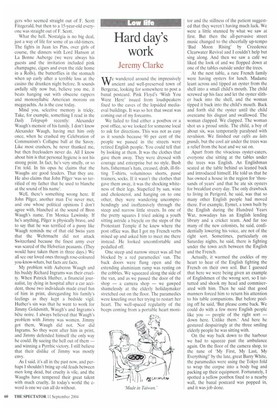Hard day's work
Jeremy Clarke
We wandered around the impressively ancient and well-preserved town of Bergerac, looking for somewhere to post a banal postcard. Pink Floyd's 'Wish You Were Here' issued from loudspeakers fixed to the eaves of the lopsided mediaeval buildings. It was so hot that sweat was coming out of my forearms.
We failed to find either a postbox or a post office, so we looked for someone local to ask for directions. This was not as easy as it sounds because 90 per cent of the people we passed in the streets were retired English people. You could tell that by looking at them. It was the clothes that gave them away. They were dressed with courage and enterprise but no style. Bush hats, fisherman's hats, creased, drab, ill-fitting T-shirts, voluminous shorts, passe trainers, socks. If it wasn't the clothes that gave them away, it was the shocking whiteness of their legs. Stupefied by sun, wine and cholesterol, and hanging on to one other, they were wandering uncomprehendingly and inoffensively through the steep and narrow little streets. In one of the pretty squares I tried asking a youth sitting astride a bicycle on the steps of the Protestant Temple if he knew where the post office was. But I got my French verbs mixed up and asked him to meet me there instead. He looked uncomfortable and pedalled off.
One steep and narrow street was all but blocked by a red paramedics' van. The back doors were flung open and the extending aluminium ramp was resting on the cobbles. We squeezed along the side of the van, and as we passed the door of the shop — a camera shop — we gawped shamelessly at the elderly holidaymaker stretched out on the floor. The paramedics were kneeling over her trying to restart her heart. The well-spaced regularity of the beeps coming from a portable heart moni tor and the stillness of the patient suggested that they weren't having much luck. We were a little stunned by what we saw at first. But then the all-pervasive street music changed to the cheerfully up-tempo 'Bad Moon Rising' by Creedence Clearwater Revival and I couldn't help but sing along. And then we saw a café we liked the look of and we flopped down at one of the tables outside under the trees.
At the next table, a rare French family were having oysters for lunch. Madame leant across and tipped an oyster from the shell into a small child's mouth. The child screwed up his face and let the oyster slither back into the shell, and the woman tipped it back into the child's mouth. Back and forth slid the oyster until the child overcame his disgust and swallowed. The woman clapped. We clapped. The woman shot us a proud smile. The child, a boy of about six, was temporarily paralysed with revulsion. We finished our cafés au lairs grands, but the cool air under the trees was a relief from the heat and we sat on.
Apart from the vivacious oyster-eaters, everyone else sitting at the tables under the trees was English. An Englishman seated at the table behind us leaned back and introduced himself. He told us that he has owned a house in the region for 'thousands of years' and that he ate six oysters for breakfast every day. The only drawback to living in Perigord, he said, was that so many other English people had moved there. For example, Eymet, a town built by the English during the Hundred Years War, nowadays has an English lending library and a cricket team. And far too many of the new colonists, he said, confidentially lowering his voice, are not of the right sort. Sometimes, particularly on Saturday nights, he said, there is fighting under the town arch between the English and the French.
Actually, it warmed the cockles of my heart to hear of the English fighting the French on their own soil. But I guessed that here we were being given an example of Englishmen of the wrong sort, so I tuttutted and shook my head and commiserated with him. Then he said that good manners forced him to return his attention to his table companions. But before peeling off he said, 'But please come back. We could do with a few more English people like you — people of the right sort — down here. Unlike them.' And here he gestured despairingly at the three smiling elderly people he was sitting with.
On the way back down to the harbour we had to squeeze past the ambulance again. On the floor of the camera shop, to the tune of 'My First, My Last, My Everything!' by the late, great Barry White, the paramedics were using the Tokyo fold to wrap the corpse into a body bag and packing up their equipment. Fortunately, I spotted a yellow postbox fixed to a nearby wall, the banal postcard was popped in, and it was job done.










































































 Previous page
Previous page